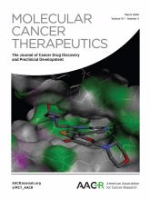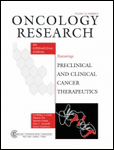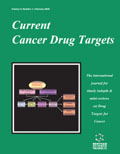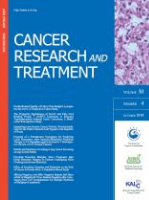
MOLECULAR CANCER THERAPEUTICS
Scope & Guideline
Empowering breakthroughs in cancer research and treatment.
Introduction
Aims and Scopes
- Novel Therapeutic Agents:
The journal features research on newly developed therapeutic agents, including small molecules, antibodies, and antibody-drug conjugates, aimed at targeting specific cancer types and overcoming resistance mechanisms. - Combination Therapies:
A significant focus is on combination therapies, which explore the synergistic effects of different treatment modalities, such as chemotherapy, immunotherapy, and targeted therapies, to enhance efficacy and reduce resistance. - Mechanisms of Drug Resistance:
Research delves into the molecular mechanisms that contribute to drug resistance in cancer, providing insights that can guide the development of new therapeutic strategies and improve treatment outcomes. - Biomarker Identification and Validation:
The identification and validation of biomarkers that predict response to therapies are crucial aspects of the journal, enhancing personalized medicine approaches in oncology. - Preclinical and Clinical Studies:
The journal publishes findings from both preclinical models and clinical trials, bridging the gap between laboratory research and patient care, thus facilitating the translation of scientific discoveries into therapeutic applications. - Tumor Microenvironment Interactions:
Research on the interactions between tumors and their microenvironment is emphasized, particularly how these interactions influence treatment response and resistance.
Trending and Emerging
- Targeted Therapy Innovations:
There is a significant trend towards the development of highly selective targeted therapies, including PROTACs and small-molecule inhibitors that address specific mutations and pathways in cancer, thereby enhancing treatment precision. - Immunotherapy and Immune Modulation:
The exploration of immunotherapy continues to gain momentum, with a focus on innovative approaches that enhance the immune response against tumors, including immune checkpoint inhibitors and T-cell engagers. - Biomarker-Driven Treatment Approaches:
Emerging research emphasizes the importance of biomarker-driven approaches to personalize cancer treatment, allowing for tailored therapies based on individual patient profiles and tumor characteristics. - Nanotechnology in Cancer Therapy:
The use of nanotechnology for drug delivery systems is on the rise, facilitating targeted and effective delivery of therapeutics to tumor sites while minimizing systemic toxicity. - Exploration of Tumor Microenvironment Dynamics:
Research increasingly focuses on understanding the tumor microenvironment's role in cancer progression and treatment response, leading to innovative strategies that target both tumor cells and their surrounding stroma. - Combination of Targeted Therapies with Immunotherapy:
There is a growing interest in the synergistic potential of combining targeted therapies with immunotherapies, which aims to enhance overall treatment efficacy and address resistance mechanisms.
Declining or Waning
- Traditional Chemotherapy Approaches:
While traditional chemotherapy remains a cornerstone in cancer treatment, research focusing solely on these approaches is declining as the field shifts towards targeted therapies and immunotherapies that offer more personalized treatment options. - Single-Agent Studies:
There is a noticeable decrease in studies investigating single-agent therapies, as the trend moves towards exploring combination therapies that leverage synergistic effects for improved outcomes. - Basic Science Without Therapeutic Application:
Research that focuses primarily on basic cancer biology without direct therapeutic implications or translational relevance is becoming less prevalent, as emphasis grows on studies that can lead to practical treatments.
Similar Journals

ONCOLOGY RESEARCH
Elevating Knowledge in the Fight Against CancerONCOLOGY RESEARCH, published by TECH SCIENCE PRESS, is a vital academic journal dedicated to the rapidly evolving field of oncology. With its ISSN 0965-0407 and E-ISSN 1555-3906, the journal serves as a key resource for researchers, clinicians, and academicians committed to advancing cancer research and treatment strategies. Operating without an Open Access model, ONCOLOGY RESEARCH provides high-quality, peer-reviewed articles that cover diverse topics within cancer research, medicine, and oncology, with its 2023 Scopus ranking placing it in the Q3 quartile. The journal's commitment to facilitating rigorous scientific discourse is evident in its historical breadth, with a publishing history dating back to 1992. ONCOLOGY RESEARCH is not only significant for the academic community but also plays a critical role in fostering new insights and approaches in the fight against cancer, making it a must-read for those involved in this critical area of study.

Molecular & Cellular Oncology
Exploring the cellular mechanisms of oncogenesis.Molecular & Cellular Oncology, published by Taylor & Francis Inc, is a vital academic journal dedicated to the exploration of cancer biology through the lens of molecular and cellular mechanisms. Since its inception in 2014, the journal has played a crucial role in disseminating innovative research findings that address the fundamental aspects of cancer research and molecular medicine. With its current ranking in Scopus placing it in the Q3 quartile for both Cancer Research and Molecular Medicine, the journal provides a platform for groundbreaking studies that push the boundaries of our understanding of oncogenesis and therapeutic interventions. Although the journal operates under a subscription model, its dedication to high-quality peer-reviewed research makes it an essential resource for researchers, professionals, and students aiming to contribute to or stay updated in the rapidly evolving field of oncology. As we approach the culmination of its converged years in 2024, Molecular & Cellular Oncology aims to continue fostering collaborations and insights that advance cancer research on a global scale.

Cancer Cell International
Championing Excellence in Cancer ScienceCancer Cell International, published by BMC, is a transformative open-access journal established in 2001, dedicated to advancing the field of oncology and cancer research. With its ISSN number not specified and an E-ISSN of 1475-2867, the journal proudly operates from the United Kingdom, located at CAMPUS, 4 Crinan St, London N1 9XW, England. Renowned for its rigorous peer-review process, Cancer Cell International has made significant strides, securing a Q2 ranking in Cancer Research and Q1 rankings in both Genetics and Oncology as of 2023. It ranks impressively in Scopus, featuring in the top quintile of Genetics (#37/347) and Oncology (#52/404), indicating its importance within the scientific community. The journal's broad scope caters to a diverse array of topics within cancer biology, making it an invaluable resource for researchers, professionals, and students seeking to stay at the forefront of cancer science. With a commitment to disseminating high-quality research, Cancer Cell International invites scholars to explore innovative findings and contribute to the collective effort of combating cancer.

CURRENT CANCER DRUG TARGETS
Advancing targeted therapies for a cancer-free tomorrow.CURRENT CANCER DRUG TARGETS is a prominent academic journal published by Bentham Science Publishers Ltd, focusing on the critical intersection of cancer research and innovative drug development. Since its inception in 2001, this journal has offered a platform for the dissemination of cutting-edge research aimed at advancing targeted cancer therapies, contributing significantly to the fields of Cancer Research, Drug Discovery, Oncology, and Pharmacology. With a respectable impact factor and consistent ranking in its respective categories, including Q2 in Drug Discovery and Pharmacology, it positions itself as an invaluable resource for researchers, clinicians, and students alike. CURRENT CANCER DRUG TARGETS is dedicated to enhancing our understanding of novel therapeutic targets and methods, thereby fostering a collaborative environment for knowledge exchange in the ever-evolving landscape of cancer treatment.

Targeted Oncology
Advancing cancer care through targeted research.Targeted Oncology is a premier, peer-reviewed journal published by SPRINGER, focusing on the latest advancements in the field of oncology, specifically targeting the development and application of targeted therapies. Since its inception in 2006, this journal has become an essential resource for researchers, healthcare professionals, and students, providing critical insights into innovative cancer treatments and the pharmacological landscape. Recognized for its impactful contributions, Targeted Oncology holds a distinguished Q1 ranking in both Oncology and Pharmacology categories as of 2023, underscoring its influence and relevance in the scientific community. With an impressive Scopus ranking reflecting its strong citation impact, the journal not only disseminates high-quality research but also facilitates knowledge exchange among oncologists and researchers working towards improving patient outcomes. Although not an Open Access journal, Targeted Oncology is committed to advancing cancer research and therapeutic strategies, making it an invaluable addition to the libraries of any institution dedicated to health and wellness.

BIOCHIMICA ET BIOPHYSICA ACTA-REVIEWS ON CANCER
Advancing the Frontiers of Cancer ResearchBIOCHIMICA ET BIOPHYSICA ACTA-REVIEWS ON CANCER, published by Elsevier, has established itself as a leading journal in the domains of cancer research, genetics, and oncology, holding a prestigious position in the Q1 quartile rankings in these fields as of 2023. With an ISSN of 0304-419X and an E-ISSN of 1879-2561, this journal aims to disseminate high-quality, impactful reviews that synthesize the latest advancements and findings in cancer biology, treatment modalities, and genomic studies. Its robust indexing and remarkable Scopus rankings—placing it in the 95th to 91st percentiles across various categories—underline its significance for researchers, clinicians, and students passionate about oncology. Operating from its Netherlands headquarters, BIOCHIMICA ET BIOPHYSICA ACTA-REVIEWS ON CANCER is dedicated to fostering a comprehensive understanding of the complex biological mechanisms underlying cancer, promoting innovative therapeutic strategies, and guiding future research directions.

Cancer Research Communications
Pioneering breakthroughs in oncology communication.Cancer Research Communications is an esteemed journal published by the American Association for Cancer Research, a leading organization in the field of oncology. This journal aims to advance knowledge in cancer research through the dissemination of high-quality, peer-reviewed articles that cover a wide range of topics related to cancer biology, treatment modalities, and prevention strategies. As an open-access journal, Cancer Research Communications ensures that vital research findings are accessible to a global audience, promoting collaboration and innovation within the scientific community. The journal serves as a crucial platform for researchers, professionals, and students to share their insights and foster the exchange of effective cancer therapies and methodologies. With a commitment to excellence, it plays a significant role in shaping the future of cancer research and therapeutic development.

JOURNAL OF EXPERIMENTAL & CLINICAL CANCER RESEARCH
Bridging experimental insights with clinical breakthroughs.The JOURNAL OF EXPERIMENTAL & CLINICAL CANCER RESEARCH, published by BMC, is a leading open-access journal dedicated to advancing the field of cancer research and oncology. Since its inception in 1982, this esteemed journal has fostered innovation and collaboration in the scientific community, as evidenced by its outstanding impact factor and position in the Q1 quartile for both Cancer Research and Oncology categories in 2023. With a proud commitment to disseminating high-quality research, the journal operates under an open-access model, ensuring that findings are readily accessible to researchers, healthcare professionals, and students worldwide. The journal has established a distinguished reputation, ranking 23rd out of 404 in Medicine oncology and 16th out of 230 in Biochemistry, Genetics, and Molecular Biology (cancer research), showcasing its importance and influence in guiding the future of cancer treatment and research. With the aim of bridging experimental and clinical research, this journal invites submissions that push the boundaries of our understanding of cancer biology and therapy.

Cancer Reports
Elevating cancer knowledge to improve patient outcomes.Cancer Reports, published by WILEY, is an esteemed open-access journal dedicated to the field of oncology and cancer research. With a focus on disseminating impactful research findings since its transition to fully open access in 2021, Cancer Reports aims to facilitate knowledge sharing among researchers, clinicians, and healthcare professionals globally. The journal is positioned within the Q3 quartile for both Cancer Research and Oncology categories as of 2023, reflecting its commitment to quality and relevance in a competitive publishing landscape. With an ISSN of N/A and an E-ISSN of 2573-8348, the journal showcases studies across diverse aspects of cancer biology, treatment modalities, and patient care strategies. Located in the United Kingdom at 111 River St, Hoboken 07030-5774, NJ, Cancer Reports strives to contribute to the advancement of cancer research and improve health outcomes for patients worldwide, making it a pivotal platform for scholars and practitioners in the oncology community.

Cancer Research and Treatment
Leading the charge in cancer research and innovation.Cancer Research and Treatment is a premier academic journal published by the Korean Cancer Association that focuses on advancing scientific knowledge and clinical practices in the fields of cancer research and oncology. With an ISSN of 1598-2998 and an E-ISSN of 2005-9256, the journal showcases cutting-edge research articles, clinical trials, and comprehensive reviews that address the multifaceted challenges in cancer treatment and management. Published in South Korea, this journal has established itself as a critical resource, evidenced by its Q1 rank in Oncology and Q2 rank in Cancer Research, reflecting its influence and stature within the academic community. The impact of research disseminated through Cancer Research and Treatment is underscored by its significant percentile rankings in Scopus, with notable positions in both the pharmaceutical and biological sectors. This journal aims to bridge the gap between laboratory research and clinical application, providing a platform for researchers, healthcare professionals, and students to enhance their understanding of cancer-related innovations and therapeutic strategies. Readers will benefit from rich content that not only discusses the latest advancements but also engages with pressing global health issues related to cancer.